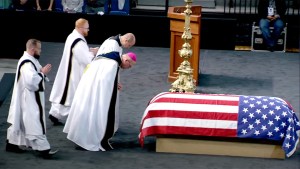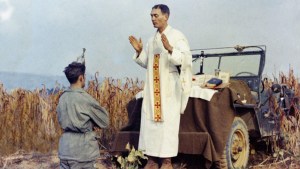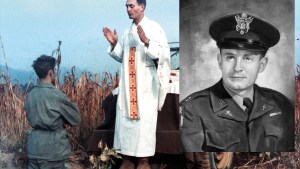Lenten Campaign 2025
This content is free of charge, as are all our articles.
Support us with a donation that is tax-deductible and enable us to continue to reach millions of readers.
For more than 70 years, the location of Fr. Emil Kapaun’s remains was unknown. This Servant of God, who is also a Congressional Medal of Honor recipient, died in May 1951, as a prisoner of war. It was not until 2021 that his remains were identified during the U.S. government’s ongoing Korean War Disinterment Project. Fr. Kapaun, it was found, had been resting in a Hawaiian military cemetery since the 1950s.
Kapaun was taken as a prisoner of war on November 2, 1950. He gave everything for his fellow POWs and the accounts of his service and charity are now under examination for his Cause of Canonization.
Here is the homily of Bishop Carl Kemme at his Funeral Mass.
~
“Give thanks to the Lord for he is good, his love is everlasting.”
Dear Brothers and Sisters in Christ, these words from the 107th psalm beautifully convey the sentiments that surround the joyful purpose of our gathering today. As the psalmist invites, we give thanks to God, who is good, for the blessing of the identification and the return of the mortal remains of Father Emil Joseph Kapaun as he is known by many here or Father KaPAWN as he is known by others especially by his military brothers who knew him and received his heroic and saintly ministry in that Prisoner of War camp 70 years ago. [Ed. note, the bishop makes reference to the common pronunciation of the priest’s name in his home diocese, which has over time shifted from the family pronunciation.]
The Lord has shown us his fatherly goodness in allowing his earthly temple, his body, to be discovered and now to be back with us in the land of his birth, Kansas.
In the name of the Diocese of Wichita, I wish to acknowledge and thank the many who are with us today as honored guests and dignitaries. First and foremost, Father Kapaun’s family, his nieces and nephews and their families, who have demonstrated such a familial devotion to their uncle. It was an honor of immeasurable proportions for me and our diocesan delegation to accompany Mr. Ray Kapaun and his wife Lee in Honolulu to bring the mortal remains of Father Emil back to Kansas. Thank you Ray for the profound privilege and experience to share in the viewing of the remains that are now enshrined in this beautiful casket. I shall never forget that moment for as long as I live.
We thank the surviving fellow POWs, who I wish to mention by name because of their importance to all of us. They are Herbert Miller, Mike Dowe, Paul Roach, Robert McGreevy, and Bailey Gillespie; please join me in thanking them for making known to the world the heroic witness of their comrade in arms, their chaplain and friend, Father Kapaun. (Applause) We thank all in the armed forces, so many of whom are with us to day from all branches and representing all ranks for your service to our country. To my brother bishops, who have honored us with your presence, Archbishop Coakley of the Archdiocese of Oklahoma City, Bishop James Conley of the Diocese of Lincoln, Bishop Shawn McKnight of the Diocese of Jefferson City, thank you brothers for returning to your home diocese to celebrate this moment of our diocesan life; we welcome Bishop Richard Spencer of the Archdiocese of the Military Services, Bishop Chad Zielinski of the Diocese of Fairbanks, himself a former army chaplain and finally our neighbor and friend to the North, Bishop Gerry Vincke of the Diocese of Salina. We are grateful for the large turnout of priests, especially visiting priests and chaplains. To leaders in government on all levels, we thank you for your presence and service to our communities. Finally, to all the faithful, young and old, from near and far, representatives from all parts of this local church and beyond, to all of you who are with us in person and the many who are joining us by livestream, it is nothing less than inspirational to see you in such great numbers as you come to pray for Father’s repose, to pay your respects to this fallen soldier, this medal of honor recipient, to this humble and saintly priest. Thank you one and all.
Six of my predecessors longed for and prayed for this day …
I consider it a singular but undeserved honor as the current bishop of Wichita to lead us today in this Mass of Christian Burial. Six of my predecessors longed for and prayed for this day, but perhaps none more so than Bishop Mark Carroll. It was Bishop Carroll, who we are confident acted under the inspiration of the Holy Spirit and allowed Father Emil to return to active duty as a military Chaplain in 1948. It was Bishop Carroll who ministered to his family when word was received of their son’s untimely demise. In the nearly monthly letters between Bishop Carroll and Father Kapaun, there is revealed a deep paternal and filial relationship between a bishop and one of his priests. I found in those letters much to ponder and consider. Bishop Carroll no doubt prayed for his military priest son to return safe and sound and to take up a long and fruitful priestly ministry here in the Diocese, which he demonstrated himself capable of before and after his first tour of duty. But such was not be to be. God’s goodness and everlasting love was to be witnessed in different and mysterious ways in the life of this young priest from Kansas.
No doubt, the Holy See and in particular the Congregation for the Causes of Saints would want me to remember and to remind you that we are not here today to beatify this man, for the work of the Church’s investigation toward canonization must continue. No, we are here today to provide for him what was not provided for him 70 years ago, a Mass of Christian burial. And though we are all praying for his intercession, we must nevertheless pray for his repose as we do for all the dead. This is our Christian duty as we bring him to his new place of rest; we are blessed to be able to offer this work of mercy for him today, for one who lived the spiritual and corporal works of mercy in heroic ways.
As we perform this service of our faith, we can rightly reflect on how the deceased conformed his life to Christ, both as priest and victim; in the case of Father Kapaun, we have no little amount of material to consider. The words of today’s Gospel I think rightly bring all of his life’s witness and service into focus: “There is no greater love, Jesus said, than to lay down one’s life for one’s friends.” Jesus modeled that love for us on the cross; he gave his life for us, his friends, so that we might not perish but might have eternal life. Father Kapaun imitated that love all throughout his ministry but it reached its fulfillment on May 23, 1951, the day of his personal calvary, in a dark and lonely place, giving all he had for others. But that imitation of Christ began long before that appointed day; it began not far from here almost 36 years before when Father’s earthly life began and was lived in a quiet, almost hidden way, but in a way that attracted the attention of family, priests, parishioners and others. Something was special about young Emil Joseph Kapaun. In so many ways, he was like his middle name namesake, Joseph, he was humble, obedient, virtuous, simple, and hardworking, as his biographer, Father Arthur Tonne would write so well of him. He would exemplify those same Joseph-like qualities all throughout his life. Could this be one of the reasons why he was identified in the Year of St. Joseph?
Little wonder then that God looked deep into the prairie of Kansas, here in the heartland of our nation, to place into a young unassuming man the desire to become a priest. No one was surprised when he declared his desire to be a priest, for he had been drawn at an early age to this way of life, this form of service, making the trip almost daily down to the church, some three miles from their country home to serve early morning Mass. In spite of feelings of unworthiness, he was ordained a priest of Jesus Christ in 1940. Like all priests, he offered his life in obedience to the bishop in whatever form of service he would be called to give, but he heard in the quiet recesses of his heart a call within a call, the call to give of himself as a chaplain in the armed forces. This request was granted by his bishop and he began then to offer that kind of loving and dedicated service for which he is most known, a sacrificial and selfless love of others, especially his beloved fellow soldiers, whom he regarded as brothers, even sons.
He was a missionary disciple of hope and that hope indubitably kept many of those men alive.
The accounts of his service to his fellow soldiers and in the last months, his fellow POWs reveal so much of the man whose body we honor today with Christian burial. His love was simple, effective, selfless and deep. I never tire of reading the accounts of how in those last months, weeks, and days, he would go at night among the huts of wounded, sick and depressed soldiers to do whatever he could to lift their spirits. He would lead them in prayer, tell a joke, sing a song, pick lice off their bodies, boil water to give them a drink of clean water to ward off dysentery, give them some meager amounts of food he had somehow managed to get, even by stealing, in short, to do whatever he could to bring light to those who entered into a darkness few of us can imagine. He was a missionary disciple of hope and that hope indubitably kept many of those men alive. And evidently, he did all of this day after day in an uncomplaining fashion, never begrudgingly, but happily, dare we say even joyfully, fulfilling God’s word which we heard in the first and second reading, being tested like gold in the furnace by laying down his life for his brothers, all the while bringing God’s love in simple and profound ways to those who were at risk of losing all hope.
Brothers and Sisters, this is what was seen and heard; but think of all that was unseen and unheard, known only to God, of this man Father Kapaun whom we are blessed to call God’s servant, an enduring testimony to the truth that there is no greater love than to lay down one’s life for one’s friends.
One of the more poignant and powerful moments for me personally in the past days happened while in Hawaii when by the invitation of Ray and his wife Lee, we were able to join them in the very room where they would view the skeletal remains of their uncle, Father Kapaun. At one point in that serene and solemn moment, Ray asked if we would like to actually touch his remains. I was stunned by the invitation and after a moment expressed my deep desire to do so. They opened a sealed clear bag that held Father’s skull and with dignity placed it on the table before us. As each of us reverently touched this relic of the man whose remains we are honored to bury today, many thoughts began to enter my mind. The skull is the physical foundation of so much of what makes us human, the face, the eyes, the ears, the mouth. As we were permitted to so gently touch this part of Father, I found myself thinking of his face which we see so much in photos; his was a caring face, a face of quiet strength, a face of character and steadfastness, a face of a friend, a brother, a comrade that brought calmness and consolation, that instilled courage and confidence. His was the face those soldiers would never forget, I thought of his eyes, eyes that saw human suffering in front of him, that saw past the dirt and grime, the lice and the disease, eyes that saw the person who needed him in that very moment. Those who were so blessed to look into his eyes I am confident saw a reflection of Jesus, to whom Father Emil had dedicated his life. I thought of his ears which heard the cries of the poor and lonely, the ears that listened to the fears and concerns of the soldiers, that heard their sins and listened beyond the words of realities far deeper than human senses can convey. And I thought of his lips and mouth that spoke words that lifted spirits and gave strength and courage, that gave absolution and freedom. It was in those places too that Father was baptized on his forehead, anointed on the crown of his head as priest, prophet and king, and ordained as a priest of Jesus Christ by the imposition of hands. From this center of who Father Kapaun was, flowed the life of a baptized Christian, the ministry of a priest, and the dedicated service of a chaplain.
Dear Friends, allow me to bring my reflections on this day to a close by extending to you an invitation and it is simply this: Come to his tomb. For us as Christians the tomb is a holy place, a place of pilgrimage and remembrance. We believe we have prepared a dignified and worthy place for his burial in our beloved Cathedral. So,I invite you all to come, family, friends, fellow priests, members of the armed forces, the young and old, the powerful and the weak. Come, all of you often and regularly to reflect on the extraordinary man whose mortal remains we will inter there today. To all who have been inspired by the ministry of his priestly life, we now have a place to be in the company of his mortal remains and to pray for his intercession, especially when for us life is dark and lonely and when we are hopeless and afraid. Come to his tomb often; pray there and sit there in the stillness of the beauty that surrounds you and let God speak to you through the example and witness of our servant of God, Father Emil Joseph Kapaun. And let us all continue to pray for his cause so that one day soon we will be able to call him the saint we are confident he truly is. For this and for all the blessings we receive, let us give thanks to God who is good; his love is everlasting.
Servant of God, Father Emil Kapaun, pray for us!




